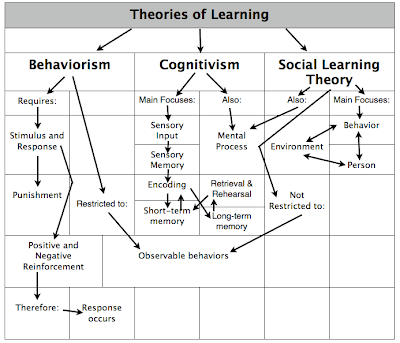Knowledge Base
Drew Allen
IDE 621
Tiffany A. Koszalka, Ph.D.
Course Instructor
Syracuse University
November 11, 2013
Drew Allen
IDE 621
Tiffany A. Koszalka, Ph.D.
Course Instructor
Syracuse University
November 11, 2013
It is evident and obvious that the three theories, Behaviorism, Cognitivism, and Social Learning, have their differences. It is also evident and not so obvious that they do have some similarities too. It's funny and interesting at the same time because these theories can be so different in one area and be eerily similar, if not exactly the same, in other areas. The interesting part about the three theories is that there isn't really a chance for them all to overlap, but without fail, they have some similarities between two at one time. For example: we all know that for Behaviorism and Cognitivism, knowledge is acquired and not constructed, which is a similarity. As for Social Learning, knowledge is constructed. The connection between Cognitivism and Social Learning involves focusing on the mental process while internal processes are examined. However, this is not the case for Behaviorism. Finally, the connection between Social Learning and Behaviorism...to me, the Social Learning Theory is my favorite and makes the most sense, and Behaviorism is my least favorite and makes the least sense so for there to be any sort of similarity is mind boggling to me... Anyway, the similarity between the two is that learning is not just restricted to observable behaviors by humans. For Cognitivism, it is.
Although I am highly technically challenged when it comes to creating charts, diagrams, pictures, or anything along those lines, I somehow managed to make this little concept map that connects the theories in the ways I described above, as well as other ways and expanding on their importance individually:
Each theory carries its own importance when it comes to instructional theories. In my opinion, the importance of teachers these days is growing more and more as education and teaching is becoming increasingly important. Good teachers are few and far between, but we shouldn't limit teaching and learning to a certain schema. We should build upon who is doing the teaching and how learning is occurring. For example, a teacher is teaching a class of students, the natural schema is to believe that only the students should be learning from the teacher, but the learning theories suggest that learning from your surrounding, your environment, your experiences, your fellow pupils, etc. is just as important as learning from a "qualified" teacher who is just representing what teaching is suppose to look like.
Overall, I enjoyed learning about the three theories, Behaviorism, Cognitivism, and Social Learning, because it truly made me step out of my comfort zone and learn something in one area that I may not agree with, and then broaden my spectrum on another aspect of learning that I may have thought I knew a lot about but didn't really until now. Having studied these theories has opened my eyes and made me realize that other people should be learning about this information too. It would only be fair :)
----> Behaviorism <----
----> Cognitivism <----
